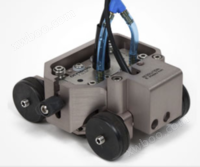Olympus HydroFORM Corrosion Detection Scanner
Olympus has developed a semi-automatic phased array solution for corrosion detection, which not only introduces a new technology to the corrosion detection market, but also presents a promising prospect for users. This technology allows users to bid farewell to the unsafe and unreliable mobile grating scanning using small UT probes; The use of phased array probes can cover a larger surface and manually move the phased array probe at a safe speed. This solution not only improves detection efficiency, but also enables the collection of data with higher resolution.
HydroFORM and RexoFORMThe design purpose is to provide a good detection scheme for detecting wall thickness reduction caused by corrosion, abrasion, and erosion. In addition, our detection scheme can also detect damage inside the wall, such as hydrogen induced foaming or delamination generated during the manufacturing process, and can easily distinguish these abnormal phenomena from wall thickness reduction.
Both scanners come with a unique quick adjustment device that allows the wedge/probe assembly to tightly engage with any curved surface with an outer diameter greater than 101 millimeters (4 inches).
Olympus HydroFORM Corrosion Detection ScannerUsed for high-performance corrosion imaging of rough and uneven surfaces
It is very convenient to perform gate synchronization relative to surface echoes for corrosion monitoring of outer and inner walls.
Removed wedge reflection.
Optimized the coupling conditions.
Superior near surface resolution.
The development of HydroFORM is based on the ingenious concept of water column, which does not require the use of wedges and has the advantages of phased array immersion tank detection. This concept utilizes a small amount of gentle water flow and consumable pads to achieve a tight bond between the probe and the detection surface, and obtain good coupling conditions, even if the detection surface is very rough.

utilizeOmniScanThe software provides the function of synchronizing gate and interface echoes, and HydroFORM can provide optimized near surface resolution, * * measurement data, and significant advantages over conventional ultrasound in defect characterization.
The XY axis imaging principle when using HydroFORM and CHAIN scanners on pipe fittings.
Manual coding

RexoFORM and pocket wheel encoder are used to detect areas that are difficult to access.

RexoFORM and VersaMOUSE are used for single line coding scanning or 2D imaging operations using built-in step buttons.

HydroFORM and its built-in pocket wheel encoder are used for single line encoding scanning or 2D imaging operations using the selected stepper clicker.
semi-automatic

RexoFORM and GLIDER are used for imaging large and smooth containers and planes along the XY axis.

RexoFORM and CHAIN scanners are used for imaging operations on the XY axis of smooth pipe fittings.

HydroFORM and CHAIN scanners are used for imaging operations on the XY axis of pipe fittings.
Olympus HydroFORM Corrosion Detection Scanner
|
|
HydroFORM |
RexoFORM |
|
phased array probe |
I4 |
A12, A14 |
|
*Large single line scanning coverage (width) |
60 mm |
38 mm (A12), 60 |
|
mm (A14) |
Delay block coupling medium |
water |
|
Rexolite |
Delay block height14 mmperhaps |
twenty-four |
|
mm20 mm |
0ºLocation of time interface echo (in steel)125 mm( |
twenty-four |
|
mmDelay block)50 mm |
Typical near surface resolution( |
1/8 |
|
in. |
Flat bottomed hole) |
1.5 mm |
|
2 mm |
depth resolution0.1 mm |
0.1 mmOuter wall detection range |
|
4 in. |
the above4 in. |
the above |
|
Inner wall detection range |
10 in. |
the above |
|
Not Applicable |
Contact device with surface |
wheel |
|
Carbide surface |
footprint |
110 mm x 130 mm |
|
40 mm x 95 mmScan directioncircumferential direction |
100circumferential directionScanning speed:one |
100mm X 1 mmresolutionmm |
|
/ |
secondmm |
/secondScanner compatibilityCHAIN(Chain) scannerCHAIN |

